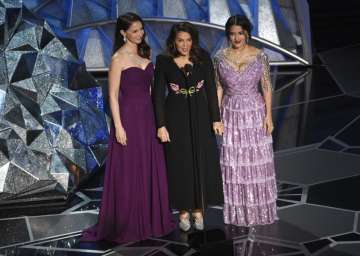The glittering ceremony of Oscars 2018 took place on March 4 but this time there was no dress code to support #MeToo. But it was a major talking point of the evening. Host Jimmy Kimmel opened the night addressing the issue and then many celebs spoke on it.
“Here’s how clueless Hollywood is about women,” Kimmel said. “We made a movie called ‘What Women Want’ and it starred Mel Gibson.”
Mixing the serious theme with a little humor, Kimmel said the world was watching — and that Hollywood needed to set an example.
“If we can stop sexual harassment in the workplace, women will only ever have to deal with harassment all the time, every place else they go,” he quipped.
And he evoked the now-disgraced name of Harvey Weinstein, whose sexual misconduct — revealed late last year — launched the stunning reckoning that has spread to other areas of society in just a few months. For years one of the biggest players at the Oscars, Weinstein has now been thrown out of the academy. Kimmel marveled that the only other person ever kicked out was a character actor who shared screeners.
The most emotional #MeToo moment, though, came courtesy of actresses Ashley Judd, Annabella Sciorra and Salma Hayek, three women who were instrumental in the unfolding Weinstein revelations. They came onstage to introduce a montage that celebrated diversity in cinematic storytelling — including gender and race.
Judd, whose accusations appeared in the first New York Times article about Weinstein, spoke about “new voices, different voices, OUR voices.”
“Time’s Up!” she said
On the red carpet, one of the many guests speaking about #MeToo was the founder of the movement, Tarana Burke.
“We did the dress code thing, and now we’re doing the work,” Burke told The Associated Press. “The plan is to continue to do this work to give people resources.”
But elsewhere on the carpet, an uncomfortable drama was playing out, as a number of stars appeared to spurn Ryan Seacrest, the E! anchor who has recently been accused of sexual misconduct — including groping — by a stylist who worked for him. Timothee Chalamet, Viola Davis, Armie Hammer, Margot Robbie and others appeared to pass him over. Some stars did speak to him, including nominees Allison Janney, Christopher Plummer and Mary J. Blige, who noted in another interview that Seacrest was “fighting for his identity.”
Seacrest has denied the allegations and E! has stood by him. But many on Twitter complained about reports that the network had instituted a 30-second delay to prevent awkward confrontations. The network said that it was “business as usual. As always, we tape multiple sources of content simultaneously to deliver the best possible show, and there are often brief delays between interviews.”
Burke, before the awards, had said Seacrest shouldn’t be on the carpet, putting stars in an awkward position. “We shouldn’t have to make those choices of, ‘Do we or don’t we?’” she told Variety.
E! was already under fire at the Golden Globes in January, where actress Eva Longoria used her interview to criticize the network over a pay equity dispute involving former anchor Catt Sadler.
(With AP Inputs)
